| Listing 1 - 10 of 36 | << page >> |
Sort by
|
Book
ISBN: 9781441193247 1441193243 1441140492 9786612765766 1441166041 1472542444 1282765760 9781441166043 9781472542441 9781441140494 Year: 2010 Publisher: London Continuum
Abstract | Keywords | Export | Availability | Bookmark
 Loading...
Loading...Choose an application
- Reference Manager
- EndNote
- RefWorks (Direct export to RefWorks)
Geoffrey Hartman: Romanticism after the Holocaust offers the first comprehensive critical account of the work of the American literary critic Geoffrey Hartman. The book aims to achieve two things: first, it charts the whole trajectory of Hartman's career (now more than half a century long) while playing close attention to the place of his career in broader cultural and intellectual contexts; second, it engages with contemporary discussions about ecology, ethics, trauma, the media, and community in order to argue that Hartman's work presents a surprisingly consistent and original position in cu
Hartman, Geoffrey H. --- Criticism --- Romanticism --- History --- 82.09 --- 82.09 Literaire kritiek --- Literaire kritiek --- Pseudo-romanticism --- Romanticism in literature --- Aesthetics --- Fiction --- Literary movements
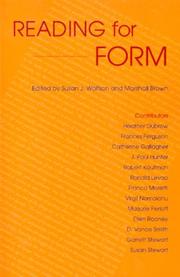
ISBN: 029580548X 9780295805481 0295986484 9780295986487 Year: 2006 Publisher: Seattle University of Washington Press
Abstract | Keywords | Export | Availability | Bookmark
 Loading...
Loading...Choose an application
- Reference Manager
- EndNote
- RefWorks (Direct export to RefWorks)
Literature, Modern --- Formalism (Literary analysis) --- Formalism (Russian literature) --- Russian formalism (Literary analysis) --- Criticism --- History and criticism. --- 82.09 --- 82.09 Literaire kritiek --- Literaire kritiek --- History and criticism
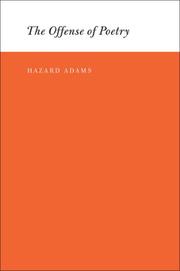
ISBN: 0295800798 9780295800790 9780295987422 0295987421 9780295987590 0295987596 Year: 2007 Publisher: Seattle University of Washington Press
Abstract | Keywords | Export | Availability | Bookmark
 Loading...
Loading...Choose an application
- Reference Manager
- EndNote
- RefWorks (Direct export to RefWorks)
Poetry --- Poetry. --- Criticism --- Poems --- Verses (Poetry) --- Literature --- History and criticism. --- Philosophy --- 82.09 --- 82-1 --- 82.09 Literaire kritiek --- Literaire kritiek --- History and criticism --- Poëzie
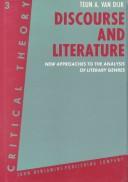
ISBN: 1283328674 9786613328670 902727973X 9789027279736 9781283328678 9789027224057 9027224056 6613328677 9027224064 0915027542 0915027550 Year: 1985 Volume: v. 3 Publisher: Amsterdam
Abstract | Keywords | Export | Availability | Bookmark
 Loading...
Loading...Choose an application
- Reference Manager
- EndNote
- RefWorks (Direct export to RefWorks)
Discourse and Literature boldly integrates the analysis of literature and non-literary genres in an innovative embracing study of discourse. Narrative, poetry, drama, myths, songs, letters, Biblical discourse and graffiti as well as stylistics and rhetorics are the topics treaded by twelve well-known specialists selected and introduced by Teun A. van Dijk.
Discourse analysis, Literary. --- Literary discourse analysis --- Rhetoric --- Literary style --- 82.09 --- 82.09 Literaire kritiek --- Literaire kritiek --- Stilistics --- Pragmatics --- Literary rhetorics --- Literary semiotics --- Analyse du discours littéraire

ISBN: 0915027143 0915027135 9780915027132 9780915027149 1283424711 9027242232 9027280118 9786613424716 Year: 1984 Volume: 1,1 1 Publisher: Philadelphia : J. Benjamins Pub. Co.,
Abstract | Keywords | Export | Availability | Bookmark
 Loading...
Loading...Choose an application
- Reference Manager
- EndNote
- RefWorks (Direct export to RefWorks)
After almost two hundred years of relative obscurity mimesis finds itself again in the limelight of Western theoretical discourse. In the Anglo-American tradition, mimesis or 'imitation' regained some prominence, at the turn of the century, through S.H. Butcher's translation of and introduction to Aristotle's Poetics, and , in the thirties, through the work of the Chicago school, also centered around Aristotle. More recently, mimesis looms large in the work of Auerbach, Burke and Frye.
792.01 --- Mimesis in literature --- 82.09 --- 82.09 Literaire kritiek --- Literaire kritiek --- Representation (Literature) --- Imitation in literature --- Realism in literature --- 792.01 Theater: theorie; esthetica --- Theater: theorie; esthetica --- Mimesis in literature.
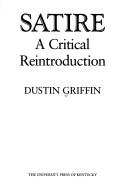
ISBN: 0813108292 0813118441 9780813108292 9780813118444 9780813147819 0813147816 1322595623 Year: 1995 Publisher: Lexington, Ky University Press of Kentucky
Abstract | Keywords | Export | Availability | Bookmark
 Loading...
Loading...Choose an application
- Reference Manager
- EndNote
- RefWorks (Direct export to RefWorks)
Here is the ideal introduction to satire for the student and, for the experienced scholar, an occasion to reconsider the uses, problems, and pleasures of satire in light of contemporary theory. Satire is a staple of the literary classroom. Dustin Griffin moves away from the prevailing moral-didactic approach established thirty some years ago to a more open view and reintegrates the Menippean tradition with the tradition of formal verse satire. Exploring texts from Aristophanes to the moderns, with special emphasis on the eighteenth century, Griffin uses a dozen figures-Horace, Juvenal, Persius, Lucian, More, Rabelais, Donne, Dryden, Pope, Swift, Blake, and Byron-as primary examples. Because satire often operates as a mode or procedure rather than as a genre, Griffin offers not a comprehensive theory but a set of critical perspectives. Some of his topics are traditional in satire criticism: the role of satire as moralist, the nature of satiric rhetoric, the impact of satire on the political order. Others are new: the problems of satire and closure, the pleasure it affords readers and writers, and the socioeconomic status of the satirist. Griffin concludes that satire is problematic, open-ended, essayistic, and ambiguous in its relationship to history, uncertain in its political effect, resistant to formal closure, more inclined to ask questions than provide answers, and ambivalent about the pleasures it offers
Satire --- History and criticism. --- 82.09 --- 82.09 Literaire kritiek --- Literaire kritiek --- History and criticism --- Thematology --- Literature --- Englisch. --- Geschichte. --- Historisk framstilling. --- Letterkunde. --- Satir. --- Satire. --- Satires. --- Virkemidler (Litteratur). --- Literary rhetorics --- Literary semiotics
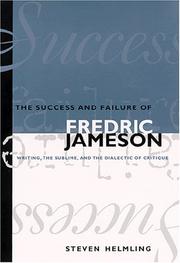
ISBN: 0791447642 0791447634 9780791447635 9780791447642 0791491641 9780791491645 Year: 2001 Publisher: Albany State University of New York Press
Abstract | Keywords | Export | Availability | Bookmark
 Loading...
Loading...Choose an application
- Reference Manager
- EndNote
- RefWorks (Direct export to RefWorks)
This is the first book to provide a critical overview of the work and career, as a whole, of the Marxist culture-critic Fredric Jameson, foremost among American intellectuals and a vanguard figure in the "theory movement" of the past three decades. Steven Helmling identifies major themes and traces both continuity and change in Jameson's engagement with the challenges presented by continental theory from the 1950s to the present. Instead of approaching Jameson's work by circumventing his notoriously difficult writing style, as many have chosen to do, Helmling takes at face value Jameson's insistence that the success and failure of critique are conditioned on how it is written. Jameson insists on a "dialectical prose" that not merely analyzes but enacts or performs the contradictions of its subjects, resulting in an agitating, dramatic, and compelling style that questions the very success or failure of critique itself. Style is thus regarded both as a salient feature of the writing, and as a problem for critical practice in general. Besides illuminating an oeuvre that's far from fully understood, the book makes a timely contribution to the current, "What was theory?" discussion.
82.09 --- Literaire kritiek --- Criticism. --- 82.09 Literaire kritiek --- Criticism --- Evaluation of literature --- Literary criticism --- Literature --- Rhetoric --- Aesthetics --- Technique --- Evaluation --- Jameson, Fredric. --- Jameson, Fredric --- Literature - General --- Languages & Literatures --- Criticism and interpretation.
Book
ISBN: 9789038218250 9038218257 Year: 2011 Volume: 3(2011) Publisher: Gent Academia Press
Abstract | Keywords | Export | Availability | Bookmark
 Loading...
Loading...Choose an application
- Reference Manager
- EndNote
- RefWorks (Direct export to RefWorks)
What will be the future role of hermeneutics in literary theory? Can we shape the future of hermeneutics by going back to its tradition and by looking at the way hermeneutics is relevant in other disciplines? The new issue of Cahier voor Literatuurwetenschap has two objectives. First, we wish to study the role of hermeneutics in other disciplines, such as the philosophy of history, theology, and the cognitive sciences. It will be clear that literary theory benefits from this interdisciplinary exercise. Second, we will have a closer look at the hermeneutical tradition in literary theory. Important chapters from the history of hermeneutics (e.g., Schleiermacher, Heidegger, Iser) are revisited and its influence in recent theoretical developments is considered.
82.09 --- 82.09 Literaire kritiek --- Literaire kritiek --- Hermeneutics. --- Hermeneutics --- Criticism. --- History. --- Criticism --- Evaluation of literature --- Literary criticism --- Literature --- Rhetoric --- Aesthetics --- Interpretation, Methodology of --- Technique --- Evaluation --- literary theory --- hermeneutics
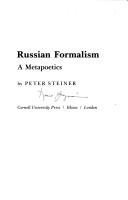
ISBN: 1501707027 9781501707025 0801417104 9780801417108 Year: 1984 Publisher: Cornell University Press
Abstract | Keywords | Export | Availability | Bookmark
 Loading...
Loading...Choose an application
- Reference Manager
- EndNote
- RefWorks (Direct export to RefWorks)
Russian Formalism, one of the twentieth century's most important movements in literary criticism, has received far less attention than most of its rivals. Examining Formalism in light of more recent developments in literary theory, Peter Steiner here offers the most comprehensive critique of Formalism to date. Steiner studies the work of the Formalists in terms of the major tropes that characterized their thought. He first considers those theorists who viewed a literary work as a mechanism, an organism, or a system. He then turns to those who sought to reduce literature to its most basic element-language-and who consequently replaced poetics with linguistics. Throughout, Steiner elucidates the basic principles of the Formalists and explores their contributions to the study of poetics, literary history, the theory of literary genre, and prosody. Russian Formalism is an authoritative introduction to the movement that was a major precursor of contemporary critical thought.
Formalism (Literary analysis) --- Formalism (Russian literature) --- Russian formalism (Literary analysis) --- Criticism --- 82.09 --- 82.09 Literaire kritiek --- Literaire kritiek --- Formalism (Literary analysis) - Soviet Union --- metapoetics --- literary theory --- linguistics --- Viktor Shklovsky --- tropological models --- Roman Jakobson --- Russian formalism --- Slavic literary theory --- Boris Ejchenbaum
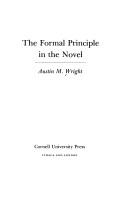
ISBN: 0801414768 0801492858 1501720945 Year: 1982 Publisher: Ithaca, N.Y.
Abstract | Keywords | Export | Availability | Bookmark
 Loading...
Loading...Choose an application
- Reference Manager
- EndNote
- RefWorks (Direct export to RefWorks)
In Interpretive Conventions, Steven Mailloux provides a general introduction to reader-response criticism while developing his own specific reader-oriented approach to literature. He examines five influential theories of the reading process-those of Stanley Fish, Jonathan Culler, Wolfgang Iser, Norman Holland, and David Bleich. He goes on to argue the need for a more comprehensive reader-response criticism based on a consistent social model of reading. He develops such a reading model and also discusses American textual editing and literary history.
Fiction --- American literature --- 82.085.43 --- 82.09 --- Literaire receptie --- Literaire kritiek --- American fiction --- Criticism --- Reader-response criticism. --- History and criticism. --- 82.09 Literaire kritiek --- 82.085.43 Literaire receptie --- Reader-response criticism --- Reader-oriented criticism --- Reception aesthetics --- Reading --- History and criticism
| Listing 1 - 10 of 36 | << page >> |
Sort by
|

 Search
Search Feedback
Feedback About UniCat
About UniCat  Help
Help News
News